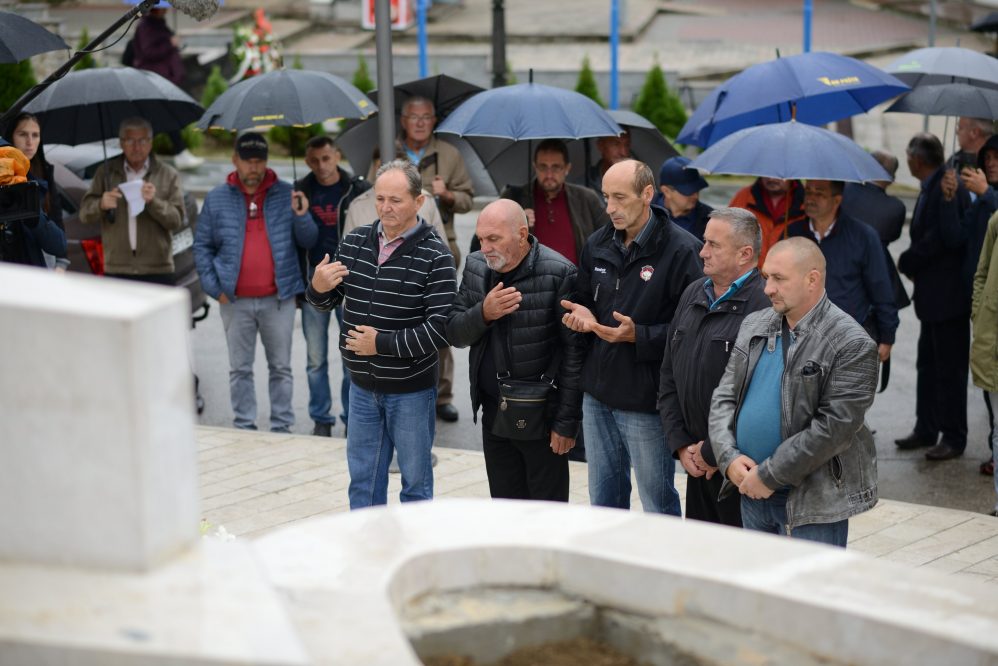On 24 September 2019, a mixed group of war veterans, some 40 former members of the Army of RBiH, HVO, HV, VRS, JNA and VJ visited sites of suffering and memorials in Jajce to pay their respects to the victims. The visit was organised by the Centre for Nonviolent Action Sarajevo/Belgrade in cooperation with RVI Jajce, HVIDR Jajce and the Jajce Association of Volunteers and Veterans.
Together with a group of peace activists, the veterans visited the central memorials commemorating killed members of the Army of RBiH and HVO, an unmarked site of the killing of Serb civilians in Bravice, a memorial for killed Bosniak civilians in Jezero (RS) and a monument to killed soldiers of HV at Plivsko Lake and of HVO at Ćaćino Polje. In addition to visiting sites of suffering, the veterans and peace activists also met with representatives of local authorities in Jajce and introduced their activities aimed at building peace and trust.

“Today, we came to Jajce to visit memorials and sites of suffering, to honour all victims. Some 40 of us war veterans found the strength to face everything that war brings, all the suffering, as well as our role in the war. We cannot turn back time and change things, but we feel the need and responsibility to work on making sure war is never an option again,” said Adnan Hasanbegović, a war veteran of the Army of RBiH and a member of the team at the Centre for Nonviolent Action.
War veterans laid flowers and paid their respects to killed Serb civilians in Bravnice near Jajce where in September 1995, according to the victims’ association, 81 civilians were killed. Nadežda Janković, who survived the attack against the civilians in Bravnice, told those present about how no one has been held responsible for this crime.
“At the front of the civilian convoy retreating from Donji Vakuf was a bus that was first hit by a shell and then they started shooting at helpless civilians. There were only civilians in the convoy and according to our information, units of the Croatian Army were the ones that launched the attack. We are calling for the prosecution of those responsible, we do not blame an entire people and we always point out that the first to come to our aid were members of the local HVO who administered first aid and transported the wounded to the hospital,” said Nadežda Janković.
Bravnice are still an unmarked site of suffering and in 2018, a group of activists provisionally marked this site and called on local authorities to enable setting up a permanent sign.

Nazif Kahrić, a veteran of MUP RBiH and the Army of RBiH, welcomed the war veterans as one of their hosts from Jajce.
“Today, we live here together and I am glad that I had the opportunity to meet veterans from the region and tell them about the suffering of Jajce and about our return to this city. I think we have sent a positive message and I was glad that the president of the Associations of Families of Shahids and Fallen Fighters said he was encouraged to see so many people come and pay their respects to the victims. I am myself encouraged by positive comments from my fellow citizens of Jajce. I think things would significantly improve with more frequent and meaningful contacts between veterans’ associations in Jajce and the region, this would do a lot to dispel tensions, and it is important that we start talking to each other,” Kahrić said.
Since 2008, CNA has been organising visits by groups of war veterans from Croatia, Serbia and BiH to sites where civilians and soldiers were killed in the past war. These visits are organised in partnership with veterans’ associations and groups from each location and to date, CNA has organised visits by war veterans to some 20 towns in BiH, Croatia and Serbia.
Sead Đulić, a former officer of the Army of RBiH from Mostar, said that he would like to see politicians encourage their counterparts from other towns to visit each other’s memorials and that he would personally like to see a mixed group of war veterans from the region visit all the sites of suffering in his home town of Mostar.

Darko Samardžić, president of HVIDR Jajce, said he was sure that today’s visit to all sites of suffering was a positive signal for Jajce.
“We have to deal with the past and look to the future, we have to create a better future at least for our children. I am personally invested in this and I hope most people who have participated in the war will think this is the way we should go. Today we visited memorials to young people who were killed and when I stand before any of those monuments, I can only say that I mourn that loss of life and hope that something like that will never happen again,” Samardžić said.
“We believe that joint actions by former enemies to commemorate and honour all victims contribute to building trust, dismantling images of the enemy in our societies and to sending a symbolic but powerful message of reconciliation,” we were told by the Centre for Nonviolent action that organised the visits to sites of suffering in Jajce.
